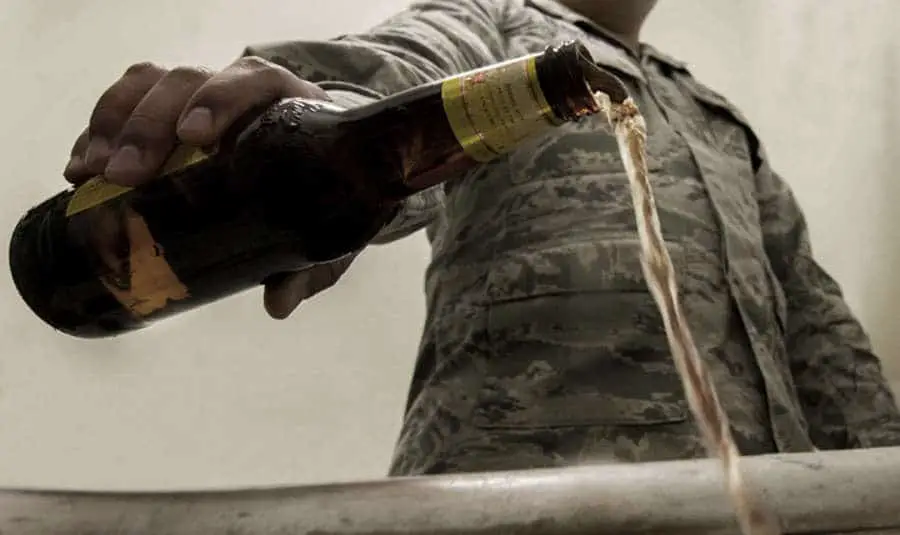For any brewer, it’s important to know how long your latest batch is going to last before it goes bad. There’s nothing worth than spending a busy day out and about only to return home for that much-deserved home-brewed bottle of beer to open it up and immediately spit it out again. Yuck!
So, how long can your home-brewed beer actually last before it goes off?
Most beers with lower alcohol content (around 4%) are best consumed in the first 6 – 9 months due to carbonation. Stronger beers or “double fermented” beers are designed to age in the bottle and will last several years. In fact, beer doesn’t go off but its taste does change with age or poor storage.
Unlike perishable food, beer doesn’t become dangerous to drink overtime but rather it may become unpleasant to drink.
There are many factors to ensuring that your hard work in brewing your latest batch of home-brew can be enjoyed way into the future. Read on to find out just how easy it is to achieve a longer beer life!
Note: the sell-by date and expiry date do not always mean the same thing. The former is a commercial deadline and the later a consumer guideline.
Generally, for a beer, you are safe to drink it for a further 6 months after the expiry date on the bottle. This is especially true for commercially produced beer as they are brewed, for the most part, under sterile conditions.

What factors shorten the shelf life of a beer?
There are three main factors which will shorten the shelf life of a beer, home-brewed or otherwise. They are exposure to light, oxygen or bacteria. All three can be fixed to a certain extent with the preparation during the brewing process and proper storage.
Light Exposure
If you have bottled your home-brew, be sure to store your beer in a place with a regulated temperature (55°F/13°C seems best!) well out of direct sunlight. Bottles are transparent and exposing them to the light can seriously affect the life of your beer and alter its taste disastrously and more quickly.
If you have a basement or cellar that would be perfect, alternatively a well-aired crawl space or attic could also serve the purpose. Failing that you can invest in a fancy beer fridge to keep your bottles in.
Kegs, on the other hand, do not suffer from the same issue of light exposure because they aren’t transparent. However, you still want to store them at a regular temperature and ensure that they have been sufficiently carbonated as per the suppliers’ instructions. See my article on why your beer may be over-carbonated and too foamy.
Oxygen Exposure
Oxygen exposure post-bottling is rare and will only occur if you did not securely seal the bottle caps or, if using corks, the material is of a lower quality. Be aware that some kits nowadays come with plastic bottles as an alternative to glass. PET isn’t completely airtight and will let oxygen in over several months. Investing in bottles specially designed for storing beer as well as a quality “capper” to fit your bottle caps is a good investment.
Oxygen is a vital part of the brewing process, but only when you actually want it. Yeast needs oxygen to successful transform sugars in the wort into ethanol and CO2. It simply won’t ferment if there isn’t enough O2 mixed in.
However, if oxygen enters in too large of a quantity in the fermenting stage it can lead to issues with your beer which you won’t notice until that first sip 3 weeks – 6 months down the line. A quality airlock is essential to avoiding the oxidization of your wort on an undesirable scale.
Bacteria Exposure
If your wort (beer mix) has been exposed to too much oxygen in the brewing process one possible side effect is a bacterial infection.
Bacteria, although good for some recipes, is generally not a welcome addition to your home-brew. It can significantly affect the taste of the beer and it will only degrade that flavor more over time. See my article about what to do if your beer tastes like vinegar or too yeasty.
What types of beer will last longer?
Your average commercially sold lagers such as Heineken or Budweiser will probably start to taste a little flat or dusty even after about its expiry date plus 6 months. It’s not going to hurt you but you won’t enjoy the experience.
My grandfather routinely gave me old beer when I used to make my bi-yearly visits (I move overseas after university) as he didn’t drink it much until I started requesting gin and tonic or wine instead.
When you move to commercially made strong beers such as those made in Belgian, you see the shelf life starting to rise. Fairly heavy beers such as Rochefort (10 for instance) you’ll find that they age rather well and can be enjoyed for a couple of years after the expiry date. Check out my article on Belgian, and other Trappist beers.
Hoppier Belgian beers do age but the taste will change dramatically from a few weeks after distribution to a few months after the brewery distributes them (buy beer from local breweries).
Frankly, I rarely kept these beers for more than a week or so when I was living in Belgium because they were just too damn tasty.
In terms of home brewing, the principle is the same. If you are producing a beer which resembles a lager, you will want to drink that fairly soon (6-9 months after brewing) even if it is stored in a keg. The same can be said of the several fine IPA recipes out there as these are best enjoyed fairly young.
When you move into brewing higher ABV beers and even darker ales, these tend to age slightly better. This is especially true of those recipes which employ bottle-conditioned techniques or a second fermentation in the bottle. These recipes are really designed to be ages for at least 6 months to a year before you even think of drinking them.
However, if you are buying these types of beers, then you can drink them immediately as that process of bottle conditioning has already taken place.
What can I do with old beer?
If you find that your beer is really reaching its true expiry date, you have perhaps three options. Drink it anyway, toss it away or recycle it.
Drink it
It’s not really going to hurt you if its a few months old, even for quality beers a year out of date may still be just fine. You don’t know until you give it a swig. If it tastes a little off then you can drink it as last beer at a party, because by that stage you may not care too much. Alternatively, give it to some needy University students (of drinking age), I’m sure they would be grateful.
Toss it
OK, it’s really too old? Fine, just throw it out and come up with a better storage plan next time. If you really can’t drink your entire batch every time think about donating it to some needy friends and family beforehand. They may even start to brew themselves when they taste how good it is.
Recycle it
There are many uses for old beer, especially around the garden. You can use it for fertilizer, both the beer itself and the spent grain. You can also use the beer in a slug trap and as a mosquito repellent for the garden.
I have an article about 26 ways to use stale beer in and around the house, check it out here.
Related Questions
How long does beer last after it’s been opened?
If you open a beer and don’t finish it then it will start to go flat after about 24 to 48 hours even if it has been refrigerated. In heat, the liquid will also start to evaporate quickly after a few hours and you may find it loses both its carbonation and alcohol content to some extent.
Does leaving beer in the Sun make it go bad?
If you leave your beer on the beach or in direct sunlight it isn’t going to make it curdle or anything. However, higher temperatures will accelerate the natural aging process of the beer. if left in the sunlight for days, then you will find that the beer will start to lose its flavor much more quickly. Warm lager, in particular, just isn’t a pleasant drinking experience.






